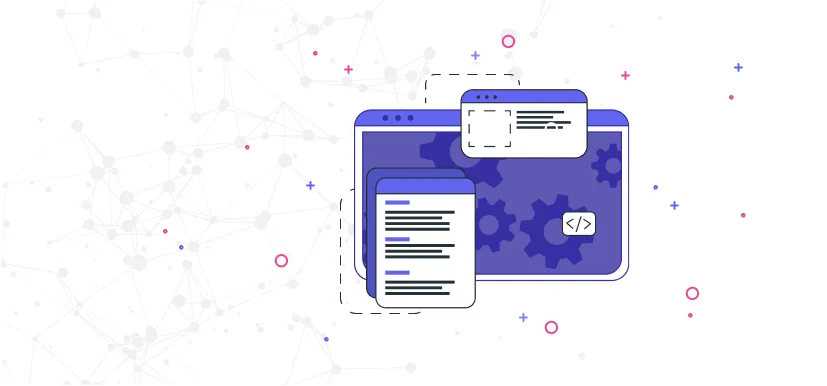- JAMstack
Using React with Node.js: The Tech Stack for High-Performance Web App Development


In the modern and competitive era, developing high-performing web apps is the need of the hour. It allows you to stand out and drive more traffic to your website. However, for top-quality app development, selecting the right technology and framework is important.
When it comes to building engaging and appealing web apps, React and Node.js are the most common options. As of 2022, about 47.12% of developers preferred using Node.js, while 42.62% of developers opted for React app development. That shows the growing popularity of both frameworks.
However, have you ever thought of combining React with Node.js? If not, you have to start considering it as it can provide you with a lot of benefits. In this blog, you will get to know why React and Node.js are considered to be ideal tech stacks for web app development.
Can React and Node.js Co-exist?
Well, React and Node.js can co-exist. They are compatible with each other. Web servers for React-based apps can be easily hosted and operated on the Node.js platform. React possesses its own set of technologies, like react-router and redux, that allows all the server-side communication to be handled by Node.js.
For instance, Whenever a user interacts with a React-built application, a request is sent to the server where the Node.js server handles the requested data through the specified URL path. Therefore together, they are a perfect stack for creating highly functional and flexible web apps where you achieve enticing UI and robust server-side support.
Now that you have an idea that both frameworks can co-exist, it is time to explore the technologies individually. It will enable you to understand better the power of combining both frameworks.
An Overview of React
React is a popular open-source front-end JavaScript library that allows you to create various reusable UI components. It leverages the pre-existing UI elements in order to develop web apps providing users with a dynamic view. The best thing about React is that it comes with several helpful functionalities and responsive features.
As a result, running the framework on different platforms is easy. Moreover, it has a very straightforward and simple design. So, professional developers can conveniently use the framework to build scalable web apps. Even if you hire a newbie for development who isn't much proficient with complex programming languages and frameworks, they can use React in a hassle-free manner.
All these aspects account for the growing popularity of React among developers. Some of the reputed companies, such as Uber, Instagram, WhatsApp, and Netflix, employ the framework for building their web apps.
Key Features of React
Take a look at some of the most prominent features of React.
Virtual DOM
Virtual Document Object Model (VDOM) is an important feature of React. React comes with a lightweight representation of the real DOM, which is known as the Virtual DOM. It makes manipulations much faster compared to the real DOM.
In other words, whenever there is a change in the state of an object, VDOM will modify that particular object only instead of changing all the objects. So, making changes to your web application is pretty simple and quick.
One-way Data Binding
As the name suggests, the data in React can only flow in a single direction. The data can be transferred from the top to the bottom. It helps in keeping everything fast and modular.
Extension
If you are planning to develop full-fledged UI applications, React can be an ideal option. It can provide you with a number of extensions for the development of web apps. It offers server-side rendering and supports mobile app development.
Some of the popular extensions of React include React Native, Flux, Redux, and more. All of these can help you in building web apps with good-looking user interfaces.
Simplicity and Debugging
The codes of React are very simple and easy to understand. So, debugging the codes is convenient and less time-consuming for the developers. Moreover, the framework has large community support. That is why testing the web apps built with React is super easy.
Performance
As discussed earlier, React leverages virtual DOM and allows you to update just the modified parts. This ensures that the DOM runs faster. Ultimately, it helps improve the overall performance of the web apps built with React.
Components
Being a component-based framework, React divides web pages into a number of components. Each of the components has its own design and logic. Moreover, the components can be reused by the developers.
Common Applications of React
After understanding the different features of React, it is important to get an idea of the most common applications. Here are the popular uses of the framework.
Web browsing apps
Creation of engaging user interfaces
Dynamic libraries
Data-extensive social media sites
Single-page applications (SPAs)
Benefits of React
Are you still wondering why to use the React framework? In that case, you must know about the many benefits it offers.
React is user-friendly in comparison to other
. So, you can easily develop SEO-friendly web apps using the framework and rank high on the search engine result page.
The virtual DOM feature helps in enhancing the functionality and performance of web apps.
Developers having good knowledge and understanding of JavaScript can easily use React for web app development.
React provides comprehensive documentation along with various tutorials and resources. As a result, learning React faster is easy.
React allows users to leverage a number of components for the development of web apps.
Keeping track of the modifications made to the specific data segments is easy in the case of React.
An Overview of Node.js
Node.js is an open-source programming language that is developed in JavaScript. It can conveniently run on a number of platforms. As a result, it helps shorten the length and process of web app development. Node.js allows the developers to build the distinctive back-end of the applications efficiently.
If you are planning to build data-intensive applications, Node.js is the perfect choice for you. It helps in enhancing the execution speed of different codes. Owing to the exceptional scalability of Node.js, it is increasingly becoming a popular choice among web app developers.
More and more companies are leveraging Node.js for their web app development projects. Some of the top companies that have used the framework for backend development are Walmart and Twitter.
Key Features of Node.js
Before you use Node.js technology, it is important to get an idea about its important features. Here are the most prominent features you must know about.
Scalable
One of the important concerns in web app development is scalability. However, if you are using Node.js, you need not worry about that. Node.js is highly scalable. It comes with an event mechanism that allows the server to respond efficiently in a non-blocking manner.
Single-Threaded
Node.js has a single-threaded architecture. Most servers create limited threads to process data. However, Node.js leverages a single-threaded program that helps handle a larger number of requests efficiently.
Cross-Platform Compatibility
Node.js is compatible with various platforms. It can be used in systems such as Linux, Windows, Mac OS X, and Unix. Moreover, it can also be effectively used on mobile devices.
Performance
Node.js is built on the V8 JavaScript engine of Google Chrome. As a result, it ensures the fast execution of codes. The JavaScript codes are converted into machine codes. It makes the implementation of codes easier and faster. Moreover, the asynchronous programming of Node.js also accounts for its high performance.
Event-Driven and Asynchronous
All the APIs in the Node.js library are asynchronous or non-blocking in nature. Servers built with Node.js do not have to wait for data from APIs. After an API has been accessed, the server will move on to the next one. To track and receive responses to previous API requests, Node.js leverages a notification mechanism known as Events.
Fast Data Streaming
Transmission of data across a number of streams can increase the overall processing time. However, Node.js comes with the ability to process data faster. It allows you to process and upload files simultaneously. As a result, you can save a great deal of time.
No Buffering
In the fast-paced world, no one likes to use an application that has a high buffering time. That is why leveraging Node.js for web app development can be an ideal choice. The callback function of the framework allows the applications to output data in the form of blocks.
So, users can receive data faster without having to wait for the completion of the entire operation. As there is no buffering time, you can easily upload video and audio files in much less time.
Applications of Node.js
The prominent uses of Node.js are listed below.
Extensive projects with thousands of package modules
Server-side proxy
Complex single-page applications (SPAs)
Development of real-time web apps
Data streaming purposes
Benefits of Node.js
Here are the main benefits of using the Node.js framework for web app development.
Node.js is scalable compared to other servers. It facilitates scaling in both vertical and horizontal directions.
It helps simplify the execution process and allows the faster execution of codes.
Node.js is capable of handling a number of requests simultaneously.
Node.js allows developers to develop, deploy, and effectively maintain web apps quickly.
It provides various tools and modules for app development.
What Are Types of Apps Developed with React and Node.js?
Now that you have an idea of the two frameworks, it is time to understand the type of apps developed using them. Well, both React and Node.js come with strong traffic handling capacity, robust backend processes, and interactive UIs. So, you can leverage them to build amazing and high-performing apps hassle-free.
Here are some of the popular types of apps that can be developed with React and Node.js.
Music streaming apps like Spotify and Pandora
Apps for blogs like Medium
Social media apps like Facebook, Instagram, and Twitter
Forum apps like StackOverflow and Reddit
E-commerce apps like Shopify and Esty
Video-sharing apps like TikTok, Snapchat, and YouTube
Real-time chatting apps like Slack and Messenger.
Why Use React with Node.js?
Are you still wondering why to use React with Node.js? In that case, you need to know the various reasons for combining them. Take a look at the most popular reasons.
Fast Development
The app development sector is becoming more and more competitive in recent times. So, time is highly valuable when developing web applications. If you cannot develop your web apps faster, it can provide your competitors with an edge in the market.
Leveraging the combination of React and Node.js can help in speeding up the app development process. It allows you to build high-performing and easy-to-maintain applications in much less time. As a result, it helps significantly reduce the time to market.
It can enable you to save a lot of time and money. Moreover, it can improve your sales and enhance the ROI of your business.
Single Language for Back-end and Front-end
JavaScript is one of the most powerful programming languages. As both frameworks are based on JavaScript, it allows you to use a single language for both back-end and front-end development. It provides developers with optimum convenience for web app development. Without switching between multiple programming languages, web apps can be developed with one language only.
Scalability
If you are willing to develop a scalable web app that is data-driven, dynamic, and responsive, combining React with Node.js is the best option. It is especially beneficial when working on large app development projects. In addition to helping develop scalable apps, it can also enable you to maintain the performance of the web apps efficiently.
Organized Process
React and Node.js are two tech stacks that are fast, effective, and scalable. So, combining these two can enable you to ensure an organized approach to app development. It makes the development process simple and convenient for the developers.
Top Benefits of Combining React with Node.js
Clients can greatly benefit by combining the tech stacks of React and Node.js. Before you actually get started with the development process, let’s understand the benefits of combining both these technologies.
Fast Prototype
Before you develop the actual web app, it is vital to building a prototype. It will allow you to test the different features of the web app. As a result, you can get a clear picture of the necessary changes and address them before the real app is developed. It can help you save a great deal of time and money.
Both React and Node.js are modern technologies. So they can enable you to develop the prototype in much less time. Ultimately, it allows you to ensure faster time to market.
Maintainability
Using React with Node.js for app development allows you to develop web apps that are easy to maintain. It is because the developers will have to use only one language to maintain the front-end and back-end of the applications. It can significantly lower the burden of the developers and enable them to save a lot of time.
SEO
React and Node.js possess rich SEO-friendly factors that make them the best choice for optimizing web app solutions adhering to SEO protocols. Prerendering is one of the essential factors of React, which enables the best practices to make the React-built Web app solutions aligned with the search engine protocols. In Prerendering, HTML and CSS are rendered much prior, which helps in loading the page quickly. This helps in enhancing the page loading time, ultimately boosting the SEO of the web app.
On the other hand, Node.js possesses its own set of SEO libraries, which helps streamline the SEO of the web app. URL-metadata, Site-mapper, and Node-meta inspector are some of the essential libraries supported by Node.js, which helps the Search engine to identify the appropriate pages to be crawled as well as in the process of web-scraping. Therefore, both React and Node.js being SEO-friendly can help you achieve and boost your web app SEO.
Reusability
The availability of reusable components speeds up Web App development. React possesses reusable components, which are actually broken into multiple pieces to render different User interface instances. In terms of NodeJS, the technology possesses the ability to share Common JS components and modules to create a scalable and maintainable codebase. So together, ReactJS and NodeJS are the perfect stack for reusability, ultimately saving money, time, and effort.
Availability of Top Developers
React and Node.js are quite popular among developers. So, if you want to develop apps using the two tech stacks, you can gain access to several excellent developers. Moreover, these frameworks have an active and vast community. It helps you to get the required assistance and resolve all the issues easily during the development process.
Maximum ROI
Increasing the ROI is the core aim of every business. Combining React and Node.js for web app development can help you achieve this goal. It enables the clients to get a high return on investment.
Using React with Node.js provides you with a better framework for the development of high-performing and fast-loading apps. It helps in improving the satisfaction of end users and attracting more traffic. As a result, it enables businesses to get high ROIs.
When to Use React with Node.js?
There are several situations when it is beneficial to use React and Node.js together. Below is a list of the top situations and conditions.
Real-Time Data
If you plan to develop a web app that deals with real-time data management, it is best to use React with Node.js. It can ensure the optimum success of your project and meet the specific requirements of the application.
Single Page Applications
For developing single-page applications (SPAs), it is ideal to use a combination of React and Node.js. It allows you to create a lightweight back-end model with the help of callback functions.
JSON APIs
React can provide you with abilities like easy code sharing and high code reusability. On the other hand, if you want to create JavaScript Object Notation API, Node.js can prove to be the best option. So, combining React and Node.js can help develop JSON APIs efficiently.
MERN Stack
MERN is a JavaScript-based framework combining MongoDB, Express, React, and Node supporting MVC architecture. MERN stack has emerged as a Potential web development stack to improve the user experience through dynamic and responsive web apps.
Developers highly prefer MERN Stack as it offers a robust database, enticing UI, and potential backend support in one place, which makes it easy for them to debug the issues as well as achieve desired results. React and Node.js being part of MERN Stack, exhibits rich-feature support to bring pace as well as quality to the development process.
Things to Consider While Using React with Node.js for Web App Development
When you have decided to combine React and Node.js for your app development project, there are various factors to consider. Here are the top things you need to take into consideration.
Type of App
First, you need to determine the type of app you want to develop. It may be social media apps, e-commerce apps, or video-sharing apps. Having an idea of the exact app you are willing to develop will enable you to decide whether it is ideal to combine React and Node.js or not. In addition to the app type, also be sure about the features that you want the web app to have. It can help in the successful development of the apps.
Benefits of React and Node.js
Next, you must have complete knowledge and understanding of the benefits of combining React and Node.js for app development. It will enable you to be more confident about your choice.
Essential Tools
To develop web apps with React and Node.js, you would require several tools. When you get the React developers for the job, they can provide you with an idea of all the necessary tools. Make sure to have all those tools before you get started with your app development project.
Experience of Developers
When you want to build web apps with React and Node.js, it is best to hire professional developers. Make sure to evaluate the knowledge, experience, and expertise of the developers. Hiring React developers who have familiarity with JavaScript. It will enable them to develop web applications with much ease.
Cost
Cost is another important factor that you cannot overlook. Before you opt for the developers or get started with the development process, it is important to set a budget. It will help in ensuring a smooth development process.
The cost of developing web apps with React and Node.js will depend on a number of factors. It includes the type of app, complexity of the app, experience of the developers, and the set deadline.
The Bottom Line
By now, you must have a comprehensive idea of the benefits of using React with Node.js for web app development. It is time to combine the two tech stacks for your next development project. React and Node.js are ideal for building responsive and contemporary applications.
The design approach of React is quite straightforward and allows the convenient building of components. On the other hand, the event-driven structure of Node.js makes it easy to handle heavy traffic volumes. Both the tech stacks are quite compatible with each other.
Combining React and Node.js and using it for web app development can not only speed up your development process but also provide various other benefits. It allows you to gain a competitive edge in the market and boost your revenues. So, it is time to get adept developers and get started with using React and Node.js for app development. Leverage React with Node.js and experience the benefits for your business.
Download the best JavaScript frameworks guide to answer the 'which JavaScript framework to use for your next project?'

